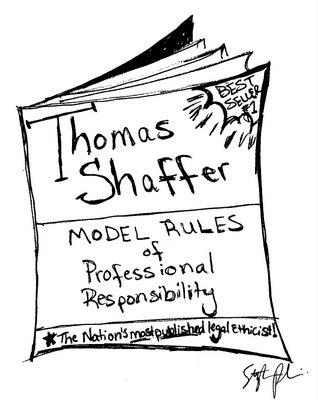Week Five, Part 1 - Ethics: Trained To Do Right
 Legal Ethics is only a one-hour class, but that doesn’t stop Dean David Link from pumping up the rhetoric.
Legal Ethics is only a one-hour class, but that doesn’t stop Dean David Link from pumping up the rhetoric."As a law school concerned with moral values, we’re not coy about ethics," he says. "We teach it by the ‘pervasive method.’ That is, ethics goes beyond this course. Every class is supposed to cover it."
His voice is deep, slightly affected. "Some schools emphasize law and economic theory," he says, referring to the University of Chicago two hours west. "We emphasize law and ethical theory."
Link reminds us that all graduates of Notre Dame Law School are required to take two classes in ethics. And he mentions that Professor Thomas Shaffer is "the nation’s most published legal ethicist."
Link holds up a yellow paperback. The title reads: "Model Rules of Professional Responsibility." He clears his throat. "These are the things you can or cannot do as a lawyer. Some are rules about civility. Others are rules to protect our monopoly over the practice of law. They’re not really ethics, but the minimus. The Rules make up the first levels of ethics."
Link walks from behind the podium and, as is his norm, swings his foot up high on the attached table. "Group expectations comprise the second level. These are what other lawyers expect you to do, and you can only be disciplined if your group has adopted them." We discuss several examples.
"The third level is personal ethics," Link says. "This is the highest level, your personal standards, how you expect yourself to perform. This level differs from the concept of prudence, although it’s both ethical and prudent to be honest."
He pauses until the room is completely quiet. "How do you gain a personal system of ethics?" he asks.
A student calls out, "From your family."
"Certainly," says Link. "I learned what was right from Mom and Dad. And from my brothers and sisters, I learned a lot about what was wrong."
We laugh.
Link guides us through other sources of personal ethics: religion, friends, personal examination, research, role models. He mentions Judge Robert A. Grant, a senior federal judge and 1930 NDLS alum, as someone influential to him.
Link then references the movie "To Kill A Mockingbird." He asks,"Was Atticus Finch an ethical lawyer? Was he effective? Why didn’t he tear the complaining witness, Mayella Ewell, to shreds when she was on the witness stand? She was lying and self-contradictory."
One student says that Finch didn’t want to alienate the jury.
Link dismisses this point of view -- a mere utilitarian argument.
Another states that it would have been unethical to badger a witness.
Link quotes from the text. "You know, when Miss Maudie is talking to Jeremy, she says, ‘We're so seldom called on to be Christians, but when we are, we've got Atticus to go for us. Whether Macon knows it or not, we pay Atticus the highest compliment – we trust him to do right.’"
"That’s an important principle," Link says. "Here at Notre Dame, we’re training you to become not just a lawyer, but also a public servant we trust to do right."
* * *

0 Comments:
Post a Comment
<< Home